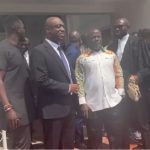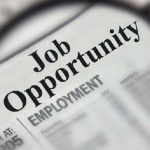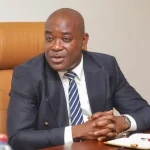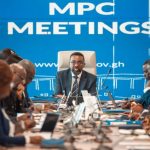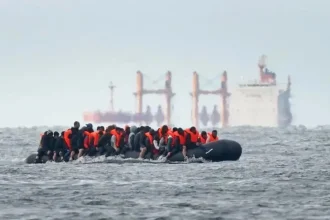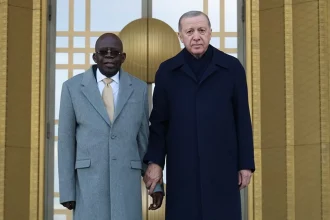A formal apology was tendered to Nigeria on Monday by the President of South Africa, Mr Cyril Ramaphosa, over the xenophobic attacks on Nigerians in his country.
He said the ugly incidents did not represent the values his country cherished.
Ramaphosa’s apology was delivered to President Muhammadu Buhari in Abuja by a special envoy he sent with his Nigerian counterpart.
When asked whether South would pay compensation to Nigerians whose property were either looted or set ablaze, the envoy replied that such issues would be tackled during Buhari’s visit.
He explained, “During President Buhari’s state visit to South Africa, there will be discussions there. I do understand that the issue of compensation and restitution is part of the agenda.
“We should wait until October 3 to see how that unfolds. But, I can indicate that as a lawyer, the South African laws require that all registered companies must have public insurance in terms of things of this nature.”
He added that up to 50 suspects had been arrested and would be prosecuted accordingly.
Speaking on why it took South Africa long time to address xenophobia, he said, “These incidents have been happening from time to time. As you know, we are still emerging from the system of apartheid, where according to statistics, the last unemployment rate was around 29 per cent.
“Some of these incidents occur in areas where there is poverty, unemployment and fight for scarce resources. But no amount of hunger, hardship, justifies the looting of property, killings of people, whether they are South Africans or foreigners. We regard that as an act of criminality.”
On the impact of the crisis on the economy of South Africa, he stated, “Obviously, there is an impact of this event on the economy and that is why the President has deemed it necessary to send us so that we record appropriately the steps and measures to deal with these methods.”
Meanwhile, the Minister of Foreign Affairs, Mr Geoffrey Onyeama, said Nigeria’s High Commissioner to South Africa, Kabiru Bala, was back home.
He said, “He (Onyeama) has not been recalled, but he has been asked to give a comprehensive picture of events there as possible to Mr President.”
The Presidency, in a statement, said Buhari at the meeting, recalled Nigeria’s sacrifices in securing democratic rule in South Africa.
“Our leadership was quite committed to the cause. We made sacrifices, which younger people of today may not know. During my last visit to South Africa with the late President Robert Mugabe, it was very emotional, as Mugabe spoke about Nigeria’s contributions to free South Africa,” the statement read in part.
The statement added that the envoy insisted that no Nigerian died in the recent crisis, contrary to earlier reports.
They reportedly said the dead were 10 in number, two Zimbabweans and eight South Africans.
Repatriation not permanent solution, says Obasanjo
Former President Olusegun Obasanjo on Monday, said the repatriation of Nigerians from South Africa was not the permanent solution to the crisis.
Obasanjo, in a letter to the President of the Inkatha Freedom Party, Prince Mangosuthu Buthelezi, which was made available to newsmen by his Special Assistant Media, Kehinde Akinyemi, explained that repatriation was palliative and could not erase the pain in the heart of the returnees.
Obasanjo also described the xenophobic attacks as a great disservice to the black race.
“Neither is revenge a desirable solution. Mutual understanding and acknowledgement of what needs to be done on all sides are imperative and getting down to doing them is the solution that will serve Nigeria and South Africa and indeed Africa well, particularly in this era of the Africa Continental Free Trade Area opportunities,” he added.
Obasanjo also emphasised the need for countries to have a programme that would provide livelihoods for their teeming youths to discourage them from embarking on hazardous journeys.
The former president further said that the failure of the South African leaders to issue a strong condemnation on the attacks showed that the government was encouraging and was an accomplice in them.
He maintained that Africans living in other Africa countries should enjoy the same constitutional rights with the citizens of such countries.
He added, “I dare say, for any African country to encourage or allow or not seriously sanction xenophobia against Africans in their country, it is a great disservice not only to the country where xenophobia takes place and the countries of the victims concerned, but also a great disservice to the whole of Africa and black race.”
Obasanjo urged countries, whose citizens were affected to table appropriate motions at the African Union and consider other measures if the situation was allowed to continue.
He added, “There is a need for fence-mending, reconciliation and wound-binding between South Africa and the countries whose citizens have been victims of xenophobia and afrophobia in South Africa.
“As a suggestion, South Africa should send emissaries to the countries concerned to explain, apologise and agree on the way forward for mutual understanding, accommodation, reconciliation, and binding the wound to promote unity, concord, and brotherhood in Africa”.
‘Don’t impose sanctions on S’Africa’
A former vice-president of African Development Bank, Dr Bisi Ogunjobi, has cautioned the Federal Government against imposing sanctions on South African over the unabating xenophobic attacks on Nigerians.
Ogunjobi, who is the current Pro-Chancellor of Samuel Adegboyega University, Ogwa, Edo State, stated this in Abuja on Monday during an interview with our correspondents shortly after he received the prestigious award of the Fellow of the Nigerian Economic Society.
He said rather than impose economic sanctions on the South Africa, the Federal Government should employ dialogue and diplomacy.
He said, “Nigeria should embrace dialogue and diplomacy in resolving the issue with South Africa. No matter what the situation is as of now, we cannot wish away South Africa or our relationship with them.”
‘Take responsibility for evacuated Nigerians’
The Federal Government has called on state governors whose citizens were among the first batch of 187 Nigerians that were evacuated from South Africa to take responsibility for their reintegration into the country.
The Chairman of the Nigerian in the Diaspora Commission, Abike Dabiri-Erewa, while giving updates on the returnees at a press conference in Abuja on Monday, stressed that they were not criminals.
She said the returnees included 30 children and a widow with four children, adding that Ogun State had the highest number of 30 persons, followed by Imo with 28 and Oyo 23, while Kogi and Benue had the least number of one person each.
Others are Abia, 7; Anambra, 13; Benue, 1; Ebonyi, 2; Edo, 13; Ekiti, 6; and Enugu 7.
The rest are Kwara, 3; Lagos, 7; Osun 6, Ondo 6 and Delta 15.
Dabiri-Erewa said, “We have profiled them according to their states and we expect the governors to take responsibility for their citizens that have returned.
“Those who returned are not criminals, they are hardworking Nigerians and have lost everything they have ever worked for in South Africa.
“Their only crime is being black and being Nigerians. We have fathers separated from their children; we have a widow with four children who just had to come back home.”
360 Nigerians cleared for Tuesday’s evacuation
About 360 Nigerians have been cleared and are ready to leave South Africa, the Chairman and Chief Executive Officer, Mr Allen Onyema, has said.
Onyema stated on Monday that the flight was expected to arrive at the Murtala Muhammed International Airport, Lagos, South Arica by 7pm on Tuesday.
According to him, out of over 600 Nigerians that are willing to come, 360 of them have been cleared for the evacuation but the airline will airlift 320 in the second batch.
He stated the capacity of the aircraft deployed for the exercise, Boeing 777, would only take 320 people per flight.
Speaking with State House Correspondents after the meeting, Radebe said, “We met with President Buhari to convey President Ramaphosa’s sincerest apologies about the incidents that have recently transpired in South Africa.
“The incidents do not represent what we stand for as a constitutional democracy in South Africa and the President has apologised for these incidents.
“He has also instructed law enforcement agencies to leave no stone unturned to bring those involved to book.
“He (Ramaphosa) also conveyed his resolve of ensuring that both Nigeria and South Africa continued to play a critical role in the rebuilding of Africa to attend the agenda 2063; the Africa that we want.
“We also recalled with fun memories the historical times that exit between Nigeria and South Africa. During the dark days of apartheid, we knew that the Nigerian people and their government stood behind our leaders, who were fighting against the obnoxious system of apartheid.”
He noted that leaders on the African continent must use the crisis as an opportunity to “make sure that the scourge of unemployment, poverty and inequality in Africa is attended to by our leaders.”
Radebe added that during Buhari’s planned visit to South Africa on October 3, the two leaders would take advantage of the existing Bi-Mission Commission to “address all those issues of mutual concern about South Africa and Nigeria.”






